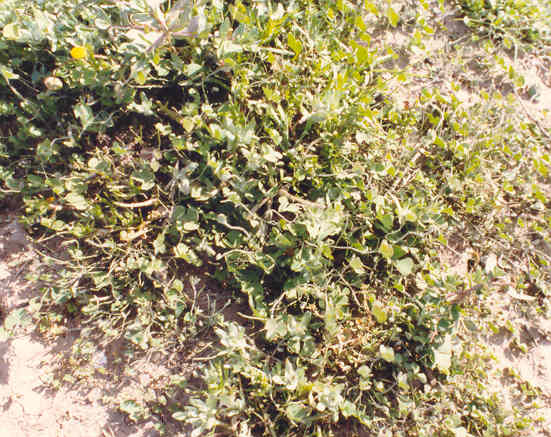
Marsilea vestita Hook. & Grev ssp. vestita.
=M. mucronata
 |
Marsilea vestita Hook. & Grev ssp. vestita.=M. mucronata
Marsileaceae (Marsilea Family)NativeClover Fern |
April Photo
Plant Characteristics:
Amphibious perennial with long-creeping rhizomes, often in water of seasonally
fluctuating depth; lvs. of submersed plants glabrous on elongate, slender
petioles, the 4-parted blade floating on the surface, the lvs. of terrestrial
plants pubescent, on short, erect, wiry, filiform petioles;
petioles 2-18 cm. long; lfts. broadly cuneate, 5-15 mm. long;
sporocarps solitary, flattened, 4-8 mm. long, 3-5 mm. broad, pedunculate
with 2 conspicuous teeth above the point of attachment, the teeth rounded and
blunt or obsolete, the sporocarps of terrestrial plants densely hairy, the
aquatic form, when present, glabrous, the sporocarps opening by 2 valves from
which a band of gelatinous tissue is emitted, bearing sori containing
megasporangia and microsporangia. The
microspores produce antheridia and the macrospores produce female gametophytes.
Sperm from the antheridia fertilize the eggs of the female gametophytes
through the water. The fertilized
eggs grow into new Marsilea sporocarps-bearing plants. (John Johnson).
Habitat:
Muddy banks, edges of ponds, etc. especially about vernal pools, below
5000 ft.; mostly in Coastal Sage Scrub and V. Grassland; scattered stations from
San Diego Co. n.; to B.C.; east to Atlantic.
Name:
Named for A. Marsigli, Italian
botanist of the 18th century. (Munz, Flora
So. Calif. 33). Latin, vestitus, dress, attire, referring to the hairs.
(Jaeger 280). (Bailey 23).
General:
Rare in the study area, found only in a small vernal pool at the bluff
top in the Castaways area. The
vernal pond was destroyed in about 1997 by grading for a subdivision along the
bluff. (my comment).
Text Ref:
Abrams, Vol. I 34; Hickman, Ed. 98; Mason 29; Munz, Flora
So. Calif. 33.
Photo Ref:
April-May 92 # 26,27.
Identity: by John Johnson.
Computer Ref: Plant Data 428.
Have plant specimen.
Last edit 3/4/03.
 |
April Photo